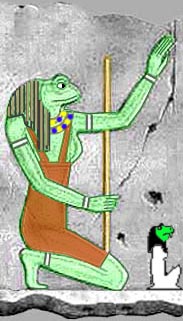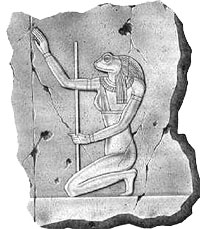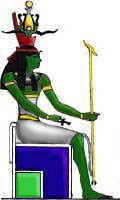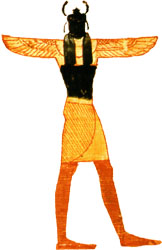|
Scriptural Text [& Editorial]
|
Commentary & Explanation
|
Footnotes ~ References ~ JST
|
 CHAPTER 8
CHAPTER 8

The Lord sends plagues of frogs, lice, and flies upon Egypt—Pharaoh
hardens his heart.
|
|
|
|
1 AND the LORD spake unto
Moses, Go unto Pharaoh, and say unto him, Thus saith the LORD, Let my people
go, that they may aserve me.
|
|
1a
OR consecrate or set apart.
b
Lev. 21:10 (10-15)
c
OR young bull (also vv. 3, 10-12,
14, 36).;
Lev. 8:2;
1 Chr. 13:9
2a
Lev. 2:4
b
HEB mingled
OR smeared
|
2 ~ F R O G S
 
Heket was the Egyptian 'frog=goddess' of childbirth or fertility. Midwives were called
'servants of Heket'. Ironically Heket hastened the final stages of labor and
delivered the babies safely. This seemingly also associates this god with
the birth of the male children of the Hebrews who the midwives said were too
lively and delived before they could assist them in their child birth.
Heqet was the daughter of the sun-god, being called the Eye of Ra. She was
the 'moon' which was linked to the ebb flow of water which seemed to raise
the frogs out of the mud and water in their germination process. Ironically
it was the Hebrews who were more fertile in child bearing than the Egyptians
and this was the concern of the Egyptians that the Hebrews were multiplying
and becoming more numerous than the Egyptians.
The attack on Heket would have been quite disquieting. Frogs were
consecrated and sacred symbols to the Egyptians. If someone killed a frog
they could be punish by death. Thus when Pharaoh's resultant plea to Moses
was to rid Egypt of the plague of frogs by distroying them, he in effect was
ordering the destruction of their own goddess Heqet. In relation to Christ,
Heqet was the Goddess of life, both of birth and rebirth of the resurrection.
This we know Christ to be, both creator and the giver of the breath of life
and of the ressurection. Thus this plague would symbolize Christ being
supreme over Heqet in this respect.
|
2 And if thou refuse to let them go, behold, I
will smite aall thy borders with
bfrogs:
3 And the river shall bring forth frogs abundantly,
which shall go up and come into thine house, and into thy bedchamber, and
upon thy bed, and into the house of thy servants, and upon thy people, and
into thine ovens, and into thy kneadingtroughs:
4 And the frogs shall come up both on thee, and upon thy people, and upon all thy servants.
|
|
1a
OR consecrate or set apart.
b
Lev. 21:10 (10-15)
c
OR young bull (also vv. 3, 10-12,
14, 36).;
Lev. 8:2;
1 Chr. 13:9
2a
Lev. 2:4
b
HEB mingled
OR smeared
|
5 ¶ And the LORD spake unto Moses, Say unto Aaron,
Stretch forth thine hand with thy rod over the streams, over the
arivers, and over the ponds, and cause frogs to come up
upon the land of Egypt.
6 And Aaron stretched out his hand over the waters of
Egypt; and the afrogs came up, and covered the land of
Egypt.
7 And the magicians did so with their enchantments, and brought up frogs upon the land of Egypt.
|
|
1a
OR consecrate or set apart.
b
Lev. 21:10 (10-15)
c
OR young bull (also vv. 3, 10-12,
14, 36).;
Lev. 8:2;
1 Chr. 13:9
2a
Lev. 2:4
b
HEB mingled
OR smeared
|
8 ¶ Then Pharaoh called for Moses and Aaron, and said, Intreat the LORD, that he may take away the frogs from me, and from my people; and I will let the people go, that they may do sacrifice unto the LORD.
9 And Moses said unto Pharaoh, aGlory
over me: when shall I intreat for thee, and for thy servants, and for thy
people, to destroy the frogs from thee and thy houses, that they may
remain in the river only?
10 And he said, To morrow. And he said, Be
it according to thy word: that thou mayest know that there
is anone blike unto the
cLORD our God.
11 And the frogs shall depart from thee, and from thy houses, and from thy servants, and from thy people; they shall remain in the river only.
|
|
|
12 And Moses and Aaron went out from Pharaoh: and Moses cried unto the LORD because of the frogs which he had brought against Pharaoh.
13 And the LORD did according to the word of Moses; and the frogs died out of the houses, out of the villages, and out of the fields.
14 And they gathered them together upon heaps: and the land stank.
15 But when Pharaoh saw that there was respite, he
ahardened his heart, and hearkened not unto them; as the
LORD had said.
|
|
|
3 ~ L I C E

Depicted as a bearded male with a goose on his head, Geb represented
the earth and was called 'the Great Cackler' for his laugh was the cause
of earthquakes. He was the third divine king of earth.
 The
throne of Egypt was known as the 'throne of Geb' in honor of his great reign. For the 'dust of the
Geb was the god of the living things of the earth and for Geb to bring forth
gnats or lice was a direct affront upon Geb. Lice were an abomination to religious
sanctity as the Egyptians prided themselves on their cleanliness. The
throne of Egypt was known as the 'throne of Geb' in honor of his great reign. For the 'dust of the
Geb was the god of the living things of the earth and for Geb to bring forth
gnats or lice was a direct affront upon Geb. Lice were an abomination to religious
sanctity as the Egyptians prided themselves on their cleanliness.
It was thought that Geb would either hold the souls of men captive in the
earth or show them the way to heaven. For Geb to inflict lice upon man was
therefore a likely inference to man's fate after death in the hereafter.
It the venacular of the day, it would amount to a statement of judgment that
'you are going to hell'.
|
16 ¶ And the LORD said unto Moses, Say unto Aaron,
Stretch out thy rod, and smite the dust of the land, that it may become
alice throughout all the land of Egypt.
17 And they did so; for Aaron stretched out his hand
with his rod, and smote the dust of the earth, and it became lice in man, and
in beast; all the dust of the land became alice throughout
all the land of Egypt.
|
|
|
18 And the magicians did so with their enchantments to
abring forth lice, but they could not: so there were lice
upon man, and upon beast.
19 Then the magicians said unto Pharaoh, This
is the afinger of God: and Pharaoh's heart was
hardened, and he hearkened not unto them; as the LORD had said.
|
|
|
4 ~ S W A R M S


Khepri or Khepera is 'He who comes into existence of himself'. He is one
of the creator gods whose symbol is the dung beetle which pushes the sun
across the sky. He has power to transform or create life, particularly that
of the insect world. He is depicted as a winged man with a beatle's head. As
the 'swarm' is translated with the 'implied' italisized 'flies', it makes one
wonder it the 'swarm' was not that of the symbol of Khepri, that being swarms
of flying beatles rather than just some type of house fly. A buzzing June Bug
Beatle certainly cause a bit more distress than a single house fly and what
would swarms of such buzzing beatles be?
That the God of Israel controlled or had all power over khepri was certainly
exemplified by the bring forth swarms of dung beatles to infest the people,
but not the Israelites. As they Israelites, the God of the Hebrews had power
not only to control but against any such powers of Khepri. This plague of the
beatle or scarab, was also an emblem of Ra, the sun god and an affront to him.
|
20 ¶ And the LORD said unto Moses, Rise up early
in the morning, and stand before Pharaoh; alo, he cometh
forth to the water; and say unto him, Thus saith the LORD, Let my people go,
that they may serve me.
21 Else, if thou wilt not let my people go, behold, I
will send swarms of aflies upon thee, and
upon thy servants, and upon thy people, and into thy houses: and the houses
of the Egyptians shall be full of swarms of flies, and also the
ground whereon they are.
|
|
|
22 And I will asever in that day the
land of Goshen, in which my people dwell, that bno swarms
of flies shall be there; to the end thou mayest know that I
am the LORD in the midst of the earth.
23 And I will put a division between my people and thy people: to morrow shall this sign be.
24 And the LORD did so; and there came a grievous
swarm of flies into the house of Pharaoh, and into his
servants' houses, and into all the land of Egypt: the land was
acorrupted by reason of the swarm of flies.
|
|
|
25 ¶ And Pharaoh called for Moses and for Aaron, and said, Go ye, sacrifice to your God in the land.
26 And Moses said, It ais not meet
so to do; for we shall sacrifice bthe abomination of the
Egyptians to the LORD our God: lo, shall we sacrifice the abomination of the
Egyptians before their eyes, and will they not stone
us?a
|
26a will they not stone us?
Evidentally there was a law against the worship of the God of the Israelites
to the effect that if any one is so caught worshipping Him and offering
sacrifice unto the God of Israel, they would be taken and stoned. Thus the
logic of removing Israel from the sight of the Egyptians seems more than to
just 'get away' but to allow Israel to worship unseen by the Egyptians who
by right of law could then legally have the Israelites stoned for so
worshipping a none Egyptian God.
|
|
27 We will go three days' journey into the wilderness, and sacrifice to the LORD our God, as he shall command us.
28 And Pharaoh said, I will let you go, that ye may sacrifice to the LORD your God in the wilderness; only ye shall not go very far away: intreat for me.
29 And Moses said, Behold, I go out from thee, and I will intreat the LORD that the swarms of flies may depart from Pharaoh, from his servants, and from his people, to morrow: but let not Pharaoh deal deceitfully any more in not letting the people go to sacrifice to the LORD.
|
|
|
30 And Moses went out from Pharaoh, and intreated the LORD.
31 And the LORD did according to the word of Moses; and he removed the swarms of flies from Pharaoh, from his servants, and from his people; there remained not one.
32 And Pharaoh hardened his heart at this time also, neither would he let the people go.
|
|
|
|
|
|
|